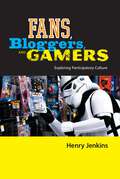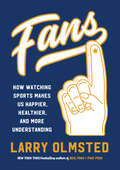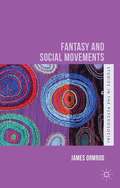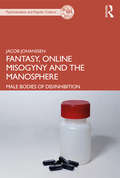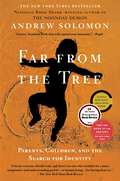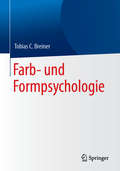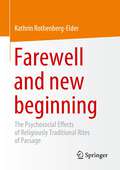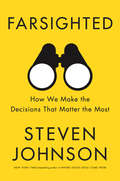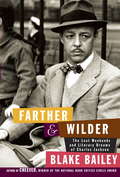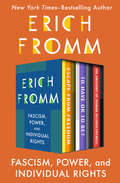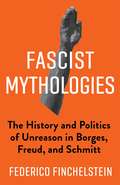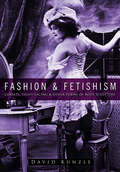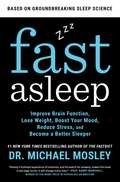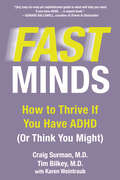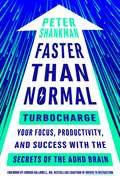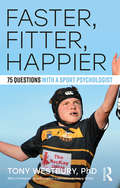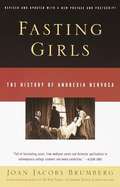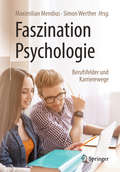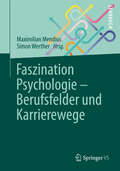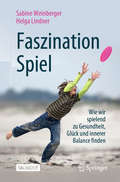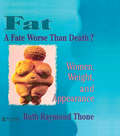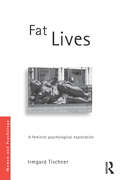- Table View
- List View
Fans, Bloggers, and Gamers: Exploring Participatory Culture
by Henry JenkinsBrings together the highlights of a decade and a half of groundbreaking research into the cultural life of media consumersHenry Jenkins's pioneering work in the early 1990s promoted the idea that fans are among the most active, creative, critically engaged, and socially connected consumers of popular culture and that they represent the vanguard of a new relationship with mass media. Though marginal and largely invisible to the general public at the time, today, media producers and advertisers, not to mention researchers and fans, take for granted the idea that the success of a media franchise depends on fan investments and participation.Bringing together the highlights of a decade and a half of groundbreaking research into the cultural life of media consumers, Fans, Bloggers, and Gamers takes readers from Jenkins's progressive early work defending fan culture against those who would marginalize or stigmatize it, through to his more recent work, combating moral panic and defending Goths and gamers in the wake of the Columbine shootings. Starting with an interview on the current state of fan studies, this volume maps the core theoretical and methodological issues in Fan Studies. It goes on to chart the growth of participatory culture on the web, take up blogging as perhaps the most powerful illustration of how consumer participation impacts mainstream media, and debate the public policy implications surrounding participation and intellectual property.
Fans: How Watching Sports Makes Us Happier, Healthier, and More Understanding
by Larry Olmsted&“Olmsted opens a window into a psychologically compelling world of passion and purpose.&” —Harvey Araton, author of Our Last Season: A Writer, a Fan, a Friendship Larry Olmsted&’s writing and research have been called &“eye-opening&” (People), &“impressive&” (Publishers Weekly, starred review), and &“enlightening&” (Kirkus Reviews). Now, the New York Times and Washington Post bestselling author turns his expertise to a subject that has never been fully explored, delivering a highly entertaining game changer that uses brand-new research to show us why being a sports fan is good for us individually and is a force for positive change in society. Fans is a passionate reminder of how games, teams, and the communities dedicated to them are vital to our lives. Citing fascinating new studies on sports fandom, Larry Olmsted makes the case that the more you identify with a sports team, the better your social, psychological, and physical health is; the more meaningful your relationships are; and the more connected and happier you are. Fans maintain better cognitive processing as their gray matter ages; they have better language skills; and college students who follow sports have higher GPAs, better graduation rates, and higher incomes after graduating. And there&’s more: On a societal level, sports help us heal after tragedies, providing community and hope when we need it most. Fans is the perfect gift for anyone who loves sports or anyone who loves someone who loves sports.
Fantasy and Social Movements
by James S. OrmrodIt is sometimes assumed that fantasizing stands in contrast to activism. This book, however, argues that fantasy plays a central role in social movements. Drawing on the psychoanalytic theories of Freud, Klein and Lacan, and psychosocial theories inspired by them, Fantasy and Social Movements examines the relationships between fantasy, reality, action, the unconscious and the collective. It makes a case for distinguishing between various 'modes of fantasy', which configure these relationships in different ways. Illustrated by a case study of activists who support the exploration, development and settlement of outer space, the book's theoretical arguments provide a platform for a critical psychosocial reworking of contemporary social movement theory. The result is a new typology of social movements that places fantasy at its core.
Fantasy, Online Misogyny and the Manosphere: Male Bodies of Dis/Inhibition
by Jacob JohanssenThis book presents the first in-depth study of online misogyny and the manosphere from a psychoanalytic perspective. The author argues that the men of the manosphere present contradictory thoughts, desires and fantasies about women which include but also go beyond misogyny. They are in a state of dis/inhibition: torn between (un)conscious forces and fantasies which erupt and are defended against. Dis/inhibition shows itself in self-victimization and defensive apathy as well as toxic agency and symbolic power and expresses itself in desire for and hatred of other bodies. The text draws on the psychoanalytic thinkers Klaus Theweleit, Elisabeth Young-Bruehl, Jessica Benjamin and Wilhelm Reich to present detailed analyses of the communities within the so-called manosphere, including incels, Men Going Their Own Way (MGTOW), alt-right YouTubers and NoFap users. Drawing on wider discussions about the status of sexuality in contemporary neoliberal technoculture since the sexual revolution of the late 1960s, it illuminates how sexuality, racism and images of the white male body shape the fantasies and affects of many men on the internet and beyond. Integrating a unique theoretical framework to help understand how today’s increase in online misogyny relates to the alt-right and fascism, Online Misogyny and the Manosphere is an important resource for academics in a variety of fields including psychoanalysis, media and communication studies, internet studies, masculinity research and more.
Far from the Tree: Parents, Children and the Search for Identity
by Andrew Solomon<P>From the National Book Award-winning author of The Noonday Demon: An Atlas of Depression comes a monumental new work, a decade in the writing, about family. <P>In Far from the Tree, Andrew Solomon tells the stories of parents who not only learn to deal with their exceptional children but also find profound meaning in doing so. Solomon's startling proposition is that diversity is what unites us all. <P>He writes about families coping with deafness, dwarfism, Down syndrome, autism, schizophrenia, multiple severe disabilities, with children who are prodigies, who are conceived in rape, who become criminals, who are transgender. While each of these characteristics is potentially isolating, the experience of difference within families is universal, as are the triumphs of love Solomon documents in every chapter. All parenting turns on a crucial question: to what extent parents should accept their children for who they are, and to what extent they should help them become their best selves. <P>Drawing on forty thousand pages of interview transcripts with more than three hundred families, Solomon mines the eloquence of ordinary people facing extreme challenges. Whether considering prenatal screening for genetic disorders, cochlear implants for the deaf, or gender reassignment surgery for transgender people, Solomon narrates a universal struggle toward compassion. Many families grow closer through caring for a challenging child; most discover supportive communities of others similarly affected; some are inspired to become advocates and activists, celebrating the very conditions they once feared. <P>Woven into their courageous and affirming stories is Solomon's journey to accepting his own identity, which culminated in his midlife decision, influenced by this research, to become a parent. Elegantly reported by a spectacularly original thinker, Far from the Tree explores themes of generosity, acceptance, and tolerance--all rooted in the insight that love can transcend every prejudice. <P>This crucial and revelatory book expands our definition of what it is to be human.
Farb- und Formpsychologie
by Tobias C. BreinerDieses Werk ist eine umfassende und praxisrelevante Darstellung zur Farb- und Formpsychologie. Mit einer klaren Sprache und über 100 farbigen Abbildungen wird Ihnen die komplexe Thematik auf eine wissenschaftliche und anregende Art veranschaulicht.Über eine allgemeine Einführung in die Grundlagen des visuellen Systems hinaus werden Sie ebenfalls spezielles Wissen zu Assoziationen, Wirkungen und Anwendungen bestimmter Farben und Formen erwerben. Speziellen Wert legt der Autor dabei auf deren Einsatz im Game Design. Es wird zudem erstmals eine neue Farbstudie präsentiert, die zeigt, dass die Assoziationen zu Farben sich in einem in sich logischen dreidimensionalen System anordnen lassen. Die daraus gezogenen überraschenden Erkenntnisse liefern mögliche Antworten auf fundamentale Fragen der Philosophie. Das Buch ist daher nicht nur ein Muss für Wahrnehmungspsychologen und Designer, sondern eine Bereicherung für alle an dieser Thematik Interessierten.
Farewell and new beginning: The Psychosocial Effects of Religiously Traditional Rites of Passage
by Kathrin Rothenberg-ElderLife is full of transitions. These transitions have to be addressed, shaped, processed and integrated into our lives in some way. Regardless of the belief in a God, traditional structures always come into view, here especially religiously traditional rites of passage such as baptism and circumcision, communion and bar mitzvah, marriage as well as convalescence, death and funeral rites. What is the psychological function of religiously traditional rites of passage today? This question will be investigated with the help of interactive interviews with functionaries and members of the religious communities of all three monotheistic currents in Northern Europe, flanked by two interviews with atheists.
Farsighted: How We Make the Decisions That Matter the Most
by Steven JohnsonThe hardest choices are also the most consequential. So why do we know so little about how to get them right? Big, life-altering decisions matter so much more than the decisions we make every day, and they're also the most difficult: where to live, whom to marry, what to believe, whether to start a company, how to end a war. There's no one-size-fits-all approach for addressing these kinds of conundrums. Steven Johnson's classic Where Good Ideas Come From inspired creative people all over the world with new ways of thinking about innovation. In Farsighted, he uncovers powerful tools for honing the important skill of complex decision-making. While you can't model a once-in-a-lifetime choice, you can model the deliberative tactics of expert decision-makers. These experts aren't just the master strategists running major companies or negotiating high-level diplomacy. They're the novelists who draw out the complexity of their characters' inner lives, the city officials who secure long-term water supplies, and the scientists who reckon with future challenges most of us haven't even imagined. The smartest decision-makers don't go with their guts. Their success relies on having a future-oriented approach and the ability to consider all their options in a creative, productive way. Through compelling stories that reveal surprising insights, Johnson explains how we can most effectively approach the choices that can chart the course of a life, an organization, or a civilization. Farsighted will help you imagine your possible futures and appreciate the subtle intelligence of the choices that shaped our broader social history.
Farther and Wilder: The Lost Weekends and Literary Dreams of Charles Jackson
by Blake BaileyFrom the prizewinning biographer of Richard Yates and John Cheever, here is the fascinating biography of Charles Jackson, the author of The Lost Weekend--a writer whose life and work encapsulated what it meant to be an addict and a closeted gay man in mid-century America, and what one had to do with the other. Charles Jackson's novel The Lost Weekend--the story of five disastrous days in the life of alcoholic Don Birnam--was published in 1944 to triumphant success. Within five years it had sold nearly half a million copies in various editions, and was added to the prestigious Modern Library. The actor Ray Milland, who would win an Oscar for his portrayal of Birnam, was coached in the ways of drunkenness by the novel's author--a balding, impeccably groomed middle-aged man who had been sober since 1936 and had no intention of going down in history as the author of a thinly veiled autobiography about a crypto-homosexual drunk. But The Lost Weekend was all but entirely based on Jackson's own experiences, and Jackson's valiant struggles fill these pages. He and his handsome gay brother, Fred ("Boom"), grew up in the scandal-plagued village of Newark, New York, and later lived in Europe as TB patients, consorting with aristocratic café society. Jackson went on to work in radio and Hollywood, was published widely, lived in the Hotel Chelsea in New York City, and knew everyone from Judy Garland and Billy Wilder to Thomas Mann and Mary McCarthy. A doting family man with two daughters, Jackson was often industrious and sober; he even became a celebrated spokesman for Alcoholics Anonymous. Yet he ultimately found it nearly impossible to write without the stimulus of pills or alcohol and felt his devotion to his work was worth the price. Rich with incident and character, Farther & Wilder is the moving story of an artist whose commitment to bringing forbidden subjects into the popular discourse was far ahead of his time.
Fascism, Power, and Individual Rights: Escape from Freedom, To Have or To Be?, and The Anatomy of Human Destructiveness
by Erich FrommThree fascinating examinations of the psychology of political power from the New York Times–bestselling author of The Art of Loving. Philosopher and social theorist Erich Fromm is renowned as “a psychologist of penetration and a writer of ability” (Chicago Tribune). In these three riveting works, Fromm sheds light on some of the most critical dilemmas facing humanity. Escape from Freedom: Though freedom has been a prized value in Western culture for centuries, it is often accompanied by feelings of anxiety and powerlessness. Fromm’s compelling study demonstrates how these feelings of alienation can lead to a desire for conformity and authoritarianism, bringing invaluable insight into the rise of Nazism and fascism in Europe. To Have or To Be?: Life in the modern age began when people no longer lived at the mercy of nature and instead took control of it. Fromm argues that through the process of modern materialism, the natural tendency of humankind moved away from practicing human abilities, and instead focused on possessing objects. Humankind therefore began using tools that replace our own powers to think, feel, and act independently. Fromm argues that positive change—both social and economic—will come from being, loving, and sharing. The Anatomy of Human Destructiveness: This classic study makes a distinction between animal aggression and certain forms of destructiveness that can only be found in human beings. His case studies span zoo animals, necrophiliacs, and the psychobiographies of notorious figures such as Hitler and Stalin, offering a comprehensive exploration of the human impulse for violence. This ebook features an illustrated biography of Erich Fromm including rare images and never-before-seen documents from the author’s estate.
Fascist Mythologies: The History and Politics of Unreason in Borges, Freud, and Schmitt (New Directions in Critical Theory #79)
by Federico FinchelsteinFor fascism, myth was reality—or was realer than the real. Fascist notions of the leader, the nation, power, and violence were steeped in mythic imagery and the fantasy of transcending history. A mythologized primordial past would inspire the heroic overthrow of a debased present to achieve a violently redeemed future. What is distinctive about fascist mythology, and how does this aspect of fascism help explain its perils in the past and present?Federico Finchelstein draws on a striking combination of thinkers—Jorge Luis Borges, Sigmund Freud, and Carl Schmitt—to consider fascism as a form of political mythmaking. He shows that Borges’s literary and critical work and Freud’s psychoanalytic writing both emphasize the mythical and unconscious dimensions of fascist politics. Finchelstein considers their ideas of the self, violence, and the sacred as well as the relationship between the victims of fascist violence and the ideological myths of its perpetrators. He draws on Freud and Borges to analyze the work of a variety of Latin American and European fascist intellectuals, with particular attention to Schmitt’s political theology. Contrasting their approaches to the logic of unreason, Finchelstein probes the limits of the dichotomy between myth and reason and shows the centrality of this opposition to understanding the ideology of fascism.At a moment when forces redolent of fascism cast a shadow over world affairs, this book provides a timely historical and critical analysis of the dangers of myth in modern politics.
Fashion and Fetishism: Corsets, Tight-Lacing and Other Forms of Body-Sculpture
by David KunzlePresenting the history of corsetry and body sculpture, this edition shows how the relationship between fashion and sex is closely bound up with sexual self-expression. It demonstrates how the use of the corset rejected the role of the passive, maternal woman, so that in Victorian times it was seen as a scandalous threat to the social order.
Fashion: A Manifesto
by Anouchka GroseWith a critical eye trained on the capitalistic allure and environmental impact of the fashion industry, this timely and stirringly argued book puts forward a radical new approach to the way we represent ourselves through our clothes.Fashion: A Manifesto takes a look at the psychology of fashion in order to unpick the hold it has on so many of us. On the one hand clothes can supposedly help you out with embodied life by concealing the bits you feel ashamed of and accentuating the bits you&’re proud of. However, fashion isn&’t really about clothes in any practical sense, but rather the endless replacement of clothes by other clothes, and especially the vilification of certain styles and the extreme elevation of others.Like gambling, fashion is a system that keeps us captivated by treating us badly, trapping us in a cycle of promises and dashed hopes by suggesting that new clothes will help us to like ourselves more. And while it&’s easy to dismiss fashion as elitist and wasteful, isn&’t fashion also fascinating, exciting and perhaps sometimes even radical—not to mention surprisingly egalitarian?Rather than insisting we give up on the pleasures that clothes have to offer, this brilliant new book by psychoanalyst and writer Anouchka Grose puts forward a post-fashion logic that rejects the parade of manufactured novelties in favor of more idiosyncratic forms of sartorial imitation.Taking us on a journey from the court of Louis XIV to TikTok&’s avant apocalypse, Fashion: A Manifesto scrutinizes fashion from a number of angles: historically, psychologically, politically, environmentally, even linguistically, to open up questions about the ways in which it works both for and against us and looks forward to a future where our clothes treat us—not to mention the planet—a great deal more kindly.
Fast Asleep: Improve Brain Function, Lose Weight, Boost Your Mood, Reduce Stress, and Become a Better Sleeper
by Dr Dr Michael MosleyThe #1 New York Times bestselling author of The Clever Gut Diet and &“one of the world&’s leading journalists covering nutrition and health&” (Dr. Valter Longo, director of the University of Southern California Longevity Institute) presents a science-based sleep program designed to improve brain function, support weight loss, boost your mood, and reduce stress. Getting a good night&’s sleep is everyone&’s daily goal. After all, it reduces your risk of depression, helps you fight chronic disease, improves your memory, and it just plain feels good. Yes, but if sleep can give us all these things and more, why is it that so many of us struggle to get the necessary seven to eight hours a night? In Fast Asleep, Dr. Michael Mosley brings together the latest, groundbreaking science to explain exactly why it is so important that we regularly get enough sleep. Prone to insomnia, he has taken part in numerous sleep experiments and tested every sleep remedy. Combining personal insight and in-depth research, he explains why so many of us struggle with sleep, what works and what doesn&’t, and shares his own myth-busting program to help you achieve a good night&’s rest. Filled with fascinating case studies, fifty delicious, sleep-promoting recipes, and more Fast Asleep is a complete resource that offers a range of tools for combating fatigue and tiredness. Simple, effective, and life-changing, this book explores the science of dreaming, explains why gut health and meal times matter, and reveals tips and tricks to help you not just to sleep better, but to reduce stress levels and feel happier and healthier in general.
Fast Minds
by Karen Weintraub Tim Bilkey Craig SurmanFAST MINDS is an acronym for common symptoms that are often seen in Attention Deficit Hyperactivity Disorder (ADHD). Millions of adults have ADHD or some of its traits, but they are under-recognized, under-treated, and often under-supported. This book empowers people with ADHD, or some of its characteristics, to adapt and thrive. By working through the program in this book, you will develop personalized strategies to take control of your life. Forgetful. Achieving below potential. Stuck in a rut. Time challenged. Motivationally challenged. Impulsive. Novelty seeking. Distractible. Scattered. If any or all of these symptoms are making it difficult for you--or someone you know--to live life to the fullest, then the clinically proven, cutting-edge program in this book will help you understand your struggles and challenges. Whether you have been diagnosed with ADHD, think you may have it, or just exhibit many of these traits, FAST MINDS will help you: Figure out what isn't working in your life, and the keys to fixing it. Build personalized strategies for managing your time, tasks, and relationships. Learn organizational habits that work for you. Stop communicating poorly, making impulsive choices and taking pointless risks. Eliminate negative thinking patterns that waste your mental energy. Create environments that support your challenges. Make the most of both medical and nonmedical resources (medication, coaching, Cognitive Behavioral Therapy, mindfulness, support groups, lifestyle change). With inspiring stories of real people who have adapted and thrived using the methods in this book, FAST MINDS will help you create the kind of life you want to live.
Fast Minds
by Karen Weintraub Tim Bilkey Craig SurmanFAST MINDS is an acronym for common symptoms that are often seen in Attention Deficit Hyperactivity Disorder (ADHD). Millions of adults have ADHD or some of its traits, but they are under-recognized, under-treated, and often under-supported. This book empowers people with ADHD, or some of its characteristics, to adapt and thrive. By working through the program in this book, you will develop personalized strategies to take control of your life.Forgetful. Achieving below potential. Stuck in a rut. Time challenged.Motivationally challenged. Impulsive. Novelty seeking. Distractible. Scattered. If any or all of these symptoms are making it difficult for you--or someone you know--to live life to the fullest, then the clinically proven, cutting-edge program in this book will help you understand your struggles and challenges. Whether you have been diagnosed with ADHD, think you may have it, or just exhibit many of these traits, FAST MINDS will help you: Figure out what isn't working in your life, and the keys to fixing it. Build personalized strategies for managing your time, tasks, and relationships. Learn organizational habits that work for you. Stop communicating poorly, making impulsive choices and taking pointless risks. Eliminate negative thinking patterns that waste your mental energy. Create environments that support your challenges. Make the most of both medical and nonmedical resources (medication, coaching, Cognitive Behavioral Therapy, mindfulness, support groups, lifestyle change).With inspiring stories of real people who have adapted and thrived using the methods in this book, FAST MINDS will help you create the kind of life you want to live.
Faster Than Normal: Turbocharge Your Focus, Productivity, and Success with the Secrets of the ADHD Brain
by Peter Shankman Edward HallowellA refreshingly practical and honest guide that rewrites the script on ADHDPeter Shankman is a busy guy -- a media entrepreneur who runs several businesses, gives keynote speeches around the world, hosts a popular podcast, runs marathons and Iron Mans, is a licensed skydiver, dabbles in angel investing, and is loving father to his young daughter. Simply put, he always seems to have more than 24 hours in a day. How does he do it? Peter attributes his unusually high energy level and extreme productivity to his ADHD. In Faster Than Normal, Shankman shares his hard-won insights and daily hacks for making ADHD a secret weapon for living a full and deeply satisfying life. Both inspiring and practical, the book presents life rules, best practices, and simple but powerful ways to:Harness your creative energy to generate and execute your ideasDirect your hyperfocus to get things done Identify your pitfalls--and avoid themStreamline your daily routine to eliminate distractionsUse apps and other tech innovations to free up your time and energyFilled with ingenious hacks and supportive self-care advice, this is the positive, practical book the ADHD community has long needed - and is also an invaluable handbook for anyone who's sick of feeling overwhelmed and wants to drive their faster-than-normal brain at maximum speed...without crashing.
Faster, Fitter, Happier: 75 questions with a Sport Psychologist
by Tony WestburyFaster, Fitter, Happier is the first book to bridge the gap between the practice of psychology across both professional and amateur sport, and the theoretical foundations on which the science is based. Author Tony Westbury has been working alongside coaches and performers across a range of sports for over 25 years, during which time he has been asked everything from the best methods to combat nerves to developing that elusive ‘will to win’. Here he provides the answers to 75 questions that encapsulate some of the most important issues he’s faced. From motivating yourself to stick to a training programme to taking a high-pressure penalty or getting back in the saddle after a fall, the book offers guidance and advice across a range of sports for both professional and amateur alike. Its accessible style is ideally suited to performers, coaches, teachers and parents, while each question also includes a summary of the theory - an invaluable resource for students and early career practitioners. With a foreword by British Lion and Scottish International Jason White, this is a unique overview of how sport psychology can support us in our everyday sporting endeavours. Engaging, insightful and practical, it will be essential reading whether you’re training for the Olympics or just losing confidence after yet another missed putt.
Fasting Girls: The History of Anorexia Nervosa
by Joan Jacobs BrumbergThis book explores eating disorders, providing both a social history of Anorexia and scientific case studies
Faszination Psychologie – Berufsfelder und Karrierewege
by Simon Werther Maximilian MendiusDieser Ratgeber nimmt Sie mit auf eine faszinierende Reise durch die vielfältigen Tätigkeitsfelder von Psychologinnen und Psychologen. Dabei lernen Sie neben den etablierten Anwendungsgebieten wie klinische Psychologie und Wirtschaftspsychologie auch vermeintlich exotische Arbeitsfelder wie Polizei- oder Verkehrspsychologie kennen. Finden Sie für sich heraus, ob Ihr Herz für eine Tätigkeit in der Psychologie schlägt und wie Sie diesen Wunsch verwirklichen können. Alle Kapitel sind von Experten aus der Praxis verfasst. Sie vermitteln Ihnen sowohl einen authentischen als auch realistischen Einblick in den jeweiligen Berufsalltag und räumen auf mit gängigen Vorurteilen. Darüber hinaus verleihen eingeflochtene Interviews mit praktisch tätigen Psychologen und Experten aus der Wissenschaft bereichernde Perspektiven. Wir bieten Ihnen:über 25 Autoren mit langjähriger Praxiserfahrungüber 15 zusätzliche Experteninterviews mit erfahrenen Praktikernüber 15 Meinungen von Professoren und anderen wissenschaftlichen Experten In dieser zweiten Auflage finden Sie neben einer Aktualisierung auch eine Erweiterung um interkulturelle Tätigkeiten in der Psychologie, um Schulpsychologie sowie um rechtliche Aspekte und Schweigepflicht.Dieses Buch ist nicht nur ideal für Bachelor-, Master- und Nebenfachstudierende der Psychologie, sondern für alle, die sich für Psychologie interessieren. Kommen Sie an Bord und lassen auch Sie sich von der Psychologie faszinieren!
Faszination Psychologie – Berufsfelder und Karrierewege
by Maximilian Mendius and Simon WertherDie Bedeutung der Psychologie in unserer Gesellschaft hat in den letzten Jahrzehnten zugenommen. Dies spiegelt sich auch in den steigenden Studentenzahlen im Bereich der Psychologie wider, sowie darin, dass ständig neue Tätigkeitsfelder für Psychologen erschlossen werden. Daher ist es für Psychologiestudierende oft unklar, welche Berufsbilder es in der Psychologie überhaupt gibt. Da Psychologiestudierende schon frühzeitig Studienschwerpunkte wählen müssen, fühlen sie sich überfordert, die richtige Entscheidung zu treffen. Sie fragen sich beispielweise, ob eine klinische oder wirtschaftspsychologische Ausbildung für sie sinnvoller ist. So sehnen sie sich nach Informationen, die ihnen diese Entscheidung erleichtert. Auch besteht oft die Frage, welche Inhalte aus dem Studium wirklich für die spätere praktische Arbeit relevant sind und wie sie als Psychologieabsolvent erfolgreich auf dem Arbeitsmarkt bestehen können.Diesen Bedarf nach Literatur und Wegweisung zur Berufsfindung und Orientierung greift dieses Werk auf und bietet genau dies: Es nimmt den Leser mit auf eine Reise durch die vielfältigen Tätigkeitsfelder von Psychologinnen und Psychologen. Dabei lernt der Leser nicht nur die etablierten Anwendungsgebiete wie klinische Psychologie und Wirtschaftspsychologie kennen, sondern auch vermeintlich eher exotische Arbeitsfelder. Somit bietet es einen hilfreichen Gesamtüberblick über die vielfältigen Karrieremöglichkeiten für alle mit psychologischen Studienabschlüssen. Die Herausgeber sind die Gründer des Psychologiestudentenkongresses, der einmal jährlich zu diesem Thema in München stattfindet. Die einzelnen Kapitel sind durchwegs von Experten aus der Praxis mit umfangreichem Erfahrungsschatz verfasst. Sie vermitteln einen authentischen wie auch einen realistischen Einblick in den Berufsalltag des jeweiligen Tätigkeitsbereichs. Darüber hinaus verleihen eingeflochtene Interviews mit praktisch tätigen Psychologen und Experten aus der Wissenschaft den Kapiteln bereichernde Perspektiven. Damit wendet sich dieses Buch nicht nur an Bachelor- und Masterstudierende der Psychologie, sondern genauso an Nebenfachstudierende sowie an alle, die sich für Psychologie interessieren.
Faszination Spiel: Wie wir spielend zu Gesundheit, Glück und innerer Balance finden
by Sabine Weinberger Helga LindnerSpielen weckt in allen Altersstufen die in uns angelegte Kreativität, Kommunikationsfähigkeit und Kooperation, die heute als Schlüsselqualifikationen für eine gelingende Lebensgestaltung im 21. Jahrhundert gelten. In unserer leistungsorientierten Gesellschaft kommt jedoch eine spielerische Herangehensweise an das Leben zu kurz. Das Buch bringt deshalb einen Gegenentwurf zum Optimierungswahn, dem Kinder ausgesetzt sind und der sich dann im Erwachsenenalter in Form der Selbstoptimierung fortsetzt. Es zeigt auf, was Spielen für Kinder bedeutet, wie sich dies im Jugendalter verändert und wie viel mehr Erwachsene bis ins hohe Alter an Lebensfreude und Gesundheit dazugewinnen können, wenn sie wieder mehr Spiel ins Leben bringen. Anhand von entwicklungspsychologischen Grundlagen, Geschichten, Metaphern und vielen Beispielen geht das Buch dem Phänomen der Faszination im Spiel nach. Es wird aufgezeigt, wie viel wir von dieser Faszination von Geburt an mitbringen, wie unterschiedlich sich diese Fähigkeit in den verschiedenen Lebensabschnitten darstellt und wie sie als wichtige Ressource für ein lebendiges Leben wieder entdeckt werden kann.Mit einem Vorwort von Prof. Dr. Gerald Hüther. "In diesem Buch findet jeder - egal ob jugendlich, erwachsen oder im Ruhestand - viele Ideen und Anregungen, wie man sich im Spiel neu entdecken und Lebensfreude empfinden kann." Dr. Martin Textor„Spielend das Leben lernen, das ermöglicht dieses Buch. Es ist so einfach: Man muss nur einer Faszination folgen. Die kann man zwar nicht “machen”, aber die Voraussetzungen dafür lassen sich schaffen. Mit einer Fülle von Anregungen. In diesem Buch.“ Prof. Dr. Wilhelm Schmid
Fat - A Fate Worse Than Death?: Women, Weight, and Appearance
by Ellen Cole Esther D Rothblum Ruth R ThoneDespite the gains of the women’s movement, women are still judged by what they look like--and men, by what they do. Fat--A Fate Worse Than Death? offers hardy resistance to the narrow, random, and irrational appearance standards set for American women through an approach that is personal, eclectic, courageous, and funny. If you are interested in giving up your diet, throwing out your scales, and concentrating on who you are on a deeper level, this book will show you how to accept, appreciate, and even love your body!Using statistics, research, anecdotes, and personal experiences, Fat--A Fate Worse Than Death? explores how appearance standards have built a prison for women. With the book’s helpful advice, reading suggestions, and list of more than 100 ways to fight looksism, sexism, ageism, and racism, you will learn to express your rights and needs, regardless of your shape or size, and tear down those prison walls. Designed to transcend the boundaries between the personal and the political, Fat--A Fate Worse Than Death? discusses: examples of how weight and size constitute the last socially accepted prejudice the national “War on Fat” counteracting societal influences that support weight preoccupation connection between appearance standards for older women and large women nurturing your body resisting male-defined standards of beauty for women the myth of diets and dieting how the body resists weight loss how women are disempowered by concentration on weight and appearance how concentrating on appearance leaves real-life issues unaddressed how feeling bad about yourself can turn you into a willing consumerFeminists, faculty and students of women’s studies programs, aging women, women of radical politics, and other concerned women and men will find that Fat--A Fate Worse Than Death? states explicitly how women are kept powerless by subscribing to cultural and social edicts on physical appearance. Don’t live silently in a society that degrades and discounts women because of their physical stature and don‘t let obsession with thinness keep you passive, docile, and unable to give your energy to things that really need your passion and intelligence. Read this book and learn to not only value yourself for who you are, but also to counteract American culture’s equality-denying prejudices and practices.
Fat Is A Feminist Issue
by Susie OrbachFat is not about food. Fat is about protection, sex, mothering, strength, assertion and love. Fat is a response to the way you are seen by your husband, your mother, your boss--and yourself. You can change that response by learning the difference between "mouth hunger" and "stomach hunger," by seeing weight loss as a good thing rather than a punishment, and by realizing that food is not your enemy. Author Orbach says most women respond to her new program by "maintaining or even gaining weight at first, as they learn to accept and like themselves. That's okay And that's just the beginning of this astonishingly effective new approach to weight loss through satisfaction. "THROW AWAY YOUR DIET BOOKS..."
Fat Lives: A Feminist Psychological Exploration (Women and Psychology)
by Irmgard TischnerEver caught somebody – or yourself – checking out the content of a ‘fat’ person’s supermarket trolley? Ever wondered what lies behind this behaviour, or what it might be like to be at the receiving end of this judging gaze? Within the context of the current ‘obesity debate’, this book investigates the embodied experience of ‘being large’ from a critical psychological perspective. Using poststructuralist and feminist theories, the author explores the discourses available to and used by self-designated ‘fat’ individuals, as well as the societal power relationships that are produced by these. Using the issues of body size and ‘fat’ as an illustration, the book describes the benefits of exploring psychological and social matters from a poststructuralist perspective, and the dangers inherent in taking reductionist approaches to public health and other social issues. As such, this book should be of particular interest to anyone working within the disciplines of psychology, sociology, and health studies, as well as those involved in the study of health, gender issues and appearance.
